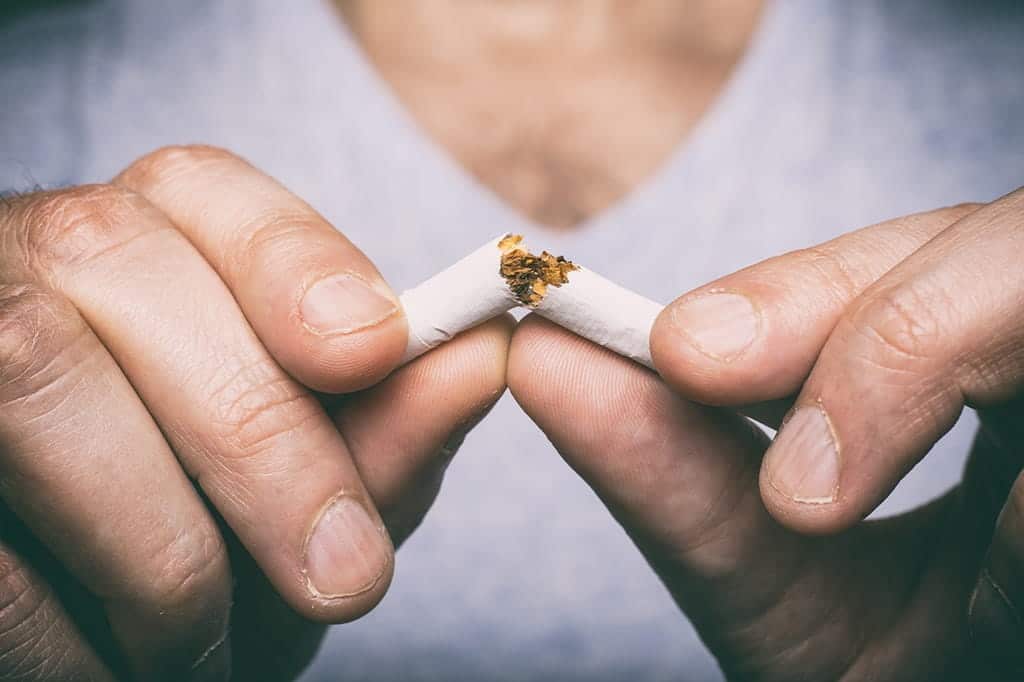Trying to quit smoking is a brave thing to do. The entire quitting journey is full of challenges and hurdles that make it feel like fighting a battle. It feels like navigating an elaborate and unpredictable web of emotional turmoils, behavioral changes, situational triggers and more. On top of all this, nicotine cravings make it a difficult feat. Nicotine withdrawal symptoms like anxiety, depression, moodiness, difficulty in concentration and so on make it a real task.
While people are generally aware of these challenges and there are so many aids available to tackle these quitting problems, people often forget one more significant area that gets impacted when you quit smoking.
We are talking about weight gain.
Many people gain weight while they are trying to quit smoking. This happens for both psychological and behavioral changes that happen when you quit smoking. While the exact reason is quite unclear according to research it happens because of:
Effects of nicotine on the body on metabolism – As you know nicotine is the main culprit behind making smoking so addictive, it is also responsible for messing up with your weight when you quit. Nicotine speeds up the body’s food processing system, aka the metabolism. This means that you digest food more rapidly when you smoke. And when you quit, your metabolism slows down. Meaning the body burns fewer kilojoules. So even if you eat the usual amount of food, it takes longer to digest and hence you put on weight.
Behavioral fixation – When you quit smoking, your mouth and hands also feel unrest. This means that they crave for some activity. Snacking behaves as a substitute for smoking. When people quit, they tend to turn to food as a coping mechanism for stress or cravings. This leads to an increased calorie intake – meaning an increase in weight.
Treating food as mood enhancer – As already mentioned, the nicotine withdrawal symptoms affect your mood significantly. These changes in the mood during smoking cessation makes one seek comfort in food. Having sweets like chocolates often uplifts our mood and we end up doing some emotional eating that is not good for the body.
Food and pleasure – when you quit smoking, your sense of taste and smell increases. These olfactory changes make the food taste even better. Food appears to be more satisfying and this derivation of pleasure leads to the overconsumption of calorie-rich options.
In addition to all this, hormonal fluctuations also change the body’s insulin sensitivity. These changes influence the fat storage and hence contribute to weight gain.
It is important to note here that while weight gain during smoking cessation is a normal thing, it can be avoided or managed by adopting a holistic approach. This means that while people do take the help of NRT products like Nicotine Gums India or stay away from triggers, it is also important to be cognizant of what you are eating during smoking cessation and what physical activity you are doing during this phase. This is because while NRT products will help manage the nicotine cravings, you need to still work on these aspects to ensure your overall well-being during the smoking cessation period.
How to manage weight during smoking cessation?
Quitting smoking is not only about focusing on managing nicotine cravings, it is also about managing the 360-degree changes that come with it.
Eat healthy!
Here are some suggestions of food items that you should include in your diet during smoking cessation:
1. Milk – It is not only good for your bones and teeth but is also a super drink that will make you give up smoking. Whenever you have an urge to light up a cigarette, consume a glass of milk right then. And if you end up smoking, it will taste really bad.
While it is not clear what component in the milk gives rise to this bitter taste but some believe that the bitter result is caused due to the chemical reaction between lactose and tobacco smoke.
2. Nuts – Whenever you feel like smoking, just reach out to nuts. It will not only help you manage your hunger caused by nicotine cravings but will also help deal with oral fixation. The soluble fiber in the nuts will slow down your digestion. They can be highly effective in helping you quit while managing your weight.
3. Cinnamon – It is one of the tastiest ways to manage nicotine cravings. Simply inhaling deeply on a cinnamon stick mimics the deep drag on a flavourful cigarette. You can chew on a small piece of cinnamon stick to curb your cravings.
Here are some additional tips that will help in controlling your eating habits during the quitting phase:
- Plan healthy meals ahead of time. Include more fruit, vegetables and wholegrain foods.
- Don’t crash diet. It usually makes stopping smoking harder. Also, if you eat too few kilojoules, your body may respond by lowering the metabolism and burning muscle tissue for fuel.
- You can also talk to your doctor or a dietician who can help you make an eating plan suited to you.
Stay physically active
In addition to this, it is also very important to indulge in some physical activity. This will not only keep your mind distracted but will also help you burn some calories. Additionally, when you exercise, it also acts as a mood lifter. When you exercise, your boosted mood helps in countering the feelings of irritability or mood swings that are quite common with nicotine withdrawal. It also helps in managing stress better.
At the end, remember that you are in charge of your quitting journey. While you do indulge in distractions and use NRT products, it is also important to pay a little attention to what you eat and avoid during this period.
